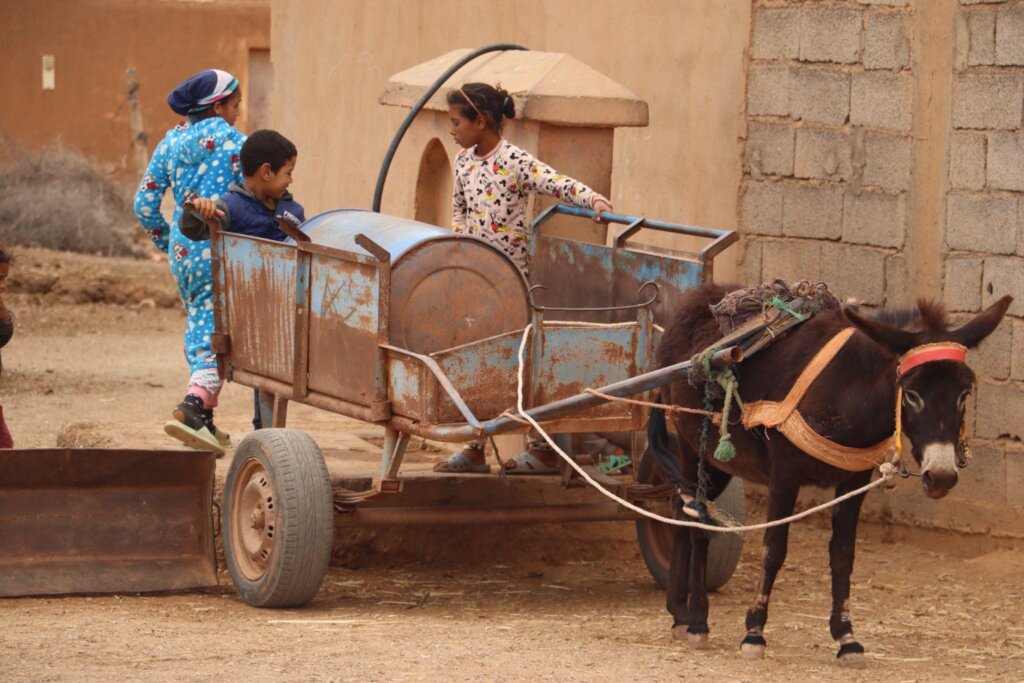By Ellie Joye | HAF intern
Water accessibility is essential to future improvements since it allows women to pursue an education.
Many can hardly imagine lacking convenient access to water, but for Mary, this is an everyday reality. Water stands between this young lady and her ability to wash her clothes, brush her teeth, and attend school. Mary describes how “water [is] very scarce,” and she is often very sick from stomach illnesses and tooth decay. Instead of attending school to further her dream of becoming a doctor, Mary walks miles every day simply to access a basic necessity.
Mary is not the only one burdened by the water crisis. Currently, more than 2 billion people live with restricted access to water resources, and 84% of these people live in rural areas. As climate change continues to wreak havoc, the water crisis is only predicted to worsen. It is estimated that by 2050, at least one in four people will be likely to live in a country affected by severe water shortages.
While easy access to clean water is certainly a human issue, it is firstly a women’s issue. Women and girls are responsible for water collection in 8 out of 10 households with water off-premises, and in a single day, women around the world will spend 200 million hours collecting water compared to only 6 million hours spent by men. Women are also particularly affected by a lack of access to clean water due to specific hygienic needs around menstruation and reproduction.
Incidentally, this is not only a water crisis but also an education crisis. Since water collection is a major activity for millions of women, they are left with little to no time for school, particularly during menstruation – 35 million girls remain out of school worldwide. Research in Ghana shows a direct link between the time a girl has to spend fetching water and school absence, and in Ethiopia, 70.6% of respondents to a questionnaire survey indicated that water accessibility impacts women’s education. It is evident that access to drinking water is a major determinant of girls’ access to a high-quality education. Unless a solution is found, the increase in water insecurity due to climate change means that more women will be continuously burdened with water collection, instead of pursuing an education.
Physically accessible water through wells is one sustainable and effective solution to the water crisis affecting women’s future success. In Morocco, the Rural Water Supply and Sanitation Project of the World Bank aimed to reduce the “burden of girls who were traditionally involved in fetching water” in order to improve school attendance. After the project, it found that girls’ school attendance increased by 20 percent in four years and that time spent collecting water by women and girls decreased by 50 to 90 percent. Simple measures, such as providing accessible clean water, are essential for enabling women and girls to attend school, graduate, and pursue employment outside of the home.
Consequently, future targets to eradicate extreme hunger and poverty may not be successful due to the current unequal participation of women stemming from lack of water. Studies have identified access, availability, and affordability to water as essential to future improvements since it drives women’s education – the most potent cure to poverty and disease. The UN Human Development Report found that “policy interventions have a greater impact in countries and regions where education outcomes are initially weaker. This has profound policy implications, potentially shifting the emphasis from efforts to boost household income to measures to improve girls’ education.” For every additional year a girl remains in school, her average income over a lifetime increases, her chances of being married early decrease, and there are clear health and education benefits for her children, making it a key factor in breaking the cycle of poverty. With access to clean water, women can achieve infinite opportunities in an environment that empowers them to grow and thrive.
Mary’s story does not end where it began. Mary’s parents came together with dozens of other families in their community to create a large well proximate to their homes and accessible at all times. Mary describes how this safe water solution has changed her life: “ I shower every day because there is enough water… and I am also able to clean my uniform often. This has helped me in that I am more confident.” Now, Mary can go on to pursue her dream of becoming a doctor since she is no longer burdened by the water crisis. Hence, urgent response should be given with regard to safe water projects because everyone should have the right to learn, dream, and achieve a better future.
Project reports on GlobalGiving are posted directly to globalgiving.org by Project Leaders as they are completed, generally every 3-4 months. To protect the integrity of these documents, GlobalGiving does not alter them; therefore you may find some language or formatting issues.
If you donate to this project or have donated to this project, you can recieve an email when this project posts a report. You can also subscribe for reports without donating.
Support this important cause by creating a personalized fundraising page.
Start a Fundraiser